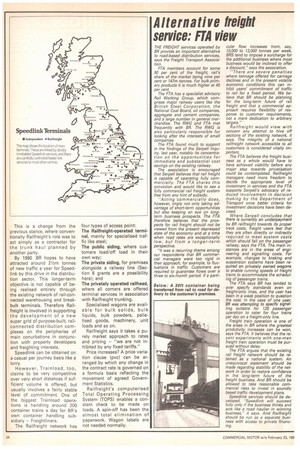Alternative freight service: RA view
Page 36

If you've noticed an error in this article please click here to report it so we can fix it.
THE FREIGHT services operated by BR provide an important alternative to road-based distribution services, says the Freight Transport Association.
FTA members account for some 90 per cent of the freight, rail's share of the market being nine per cent or 147m tonnes. For bulk primary products it is much higher at 45 per cent.
The FTA has a specialist advisory Rail Working Group, which comprises major railway users like the British Steel Corporation, the National Coal Board, oil companies, aggregate and cement companies, and a large number in general merchandise. The RWG and FTA met frequently with BR. The RWG is also particularly responsible for looking after the interests of small companies.
The FTA found much to support in the findings of the Serpell Inquiry, last year, notably its concentration on the opportunities for immediate and substantial cost savings on the existing railway.
The association is encouraged that Serpell believes that rail freight is capable of operating fully commercially. The FTA shares this conviction and would like to see a fully commercial rail freight system free from any hint of subsidy.
"Acting commercially does, however, imply not only taking advantage of short-term opportunities but also keeping an eye on longterm business prospects. The FTA therefore believes that the prospects for rail freight should not be viewed from the present depressed state of the economy and at a time when road rates are exceptionally low, but from a longer-term perspective.
"It was a recurring theme among our respondents that BR commercial managers were too rigid in their approach, for example, to fluctuations in traffic. Customers are required to guarantee flows over a three to six-month period. If a parti cular flow increases tram, say, 10,000 to 13,000 tonnes per week, BRS tend to impose a surcharge for the additional business where most business would be inclined to offer a discount," says the association.
"There are severe penalties where tonnage offered for carriage declines and in the present volatile economic conditions this can inhibit users' commitment of traffic to rail for a fixed period. We believe that BR should be planning for the long-term future of rail freight and that a commercial approach requires flexibility of response to customer requirements, not a mere dedication to arbitrary targets."
Railfreight would view with concern any attemot to hive off sections of the existing network, it says. The integrity of a national railfreight network accessible to all customers is considered vitally important.
The FTA believes the freight business as a whole would have to have achieved viability before any major step towards privatisation could be contemplated. Railfreight managers need more freedom to decide the appropriate level of investment in services and the FTA supports Serpell's advocacy of reduced involvement in decision making by the Department of Transport once better criteria for investment decisions have been devised.
Where Serpell concludes that there is currently an underpayment by BR railfreight towards its proper track costs, freight users feel that they are often directly or indirectly required to meet system costs which should fall on the passenger railway, says the FTA. The main instances are in the areas of engineering and signalling costs. For example, changes to braking and suspension systems have been required on privately owned wagons to enable running speeds of freight trains to accommodate the scheduling of passenger trains. The FTA says BR has tended to over specify standards even on freight-only lines, and the user has been in a weak position to question the cost. In the case of one user. BR was attempting to specify signalling suitable for 125 passenger operation to cater for four trains per day on a freight-only line.
Freight train operation is one of the areas in BR where the greatest produtiyity increases can be won, says the FTA. It believes that the recent experiments with one-man freight train operation must be pursued without delay.
The FTA argues that the existing rail freight network should be retained as a national system. An unequivocal statement should be made regarding stability of the network in order to restore confidence in the long-term future of the freight business. And BR should be allowed to take reasonable commercial risks to invest in soundly based traffic development plans.
Speedlink services should be developed. "Speedlink will succeed fully only if the business thinks and acts like a road haulier in winning business," it says. And Railfreight should be run as a separate business with access to private financing.




















































































